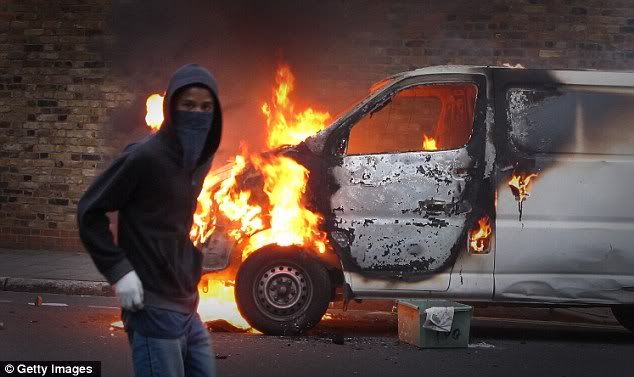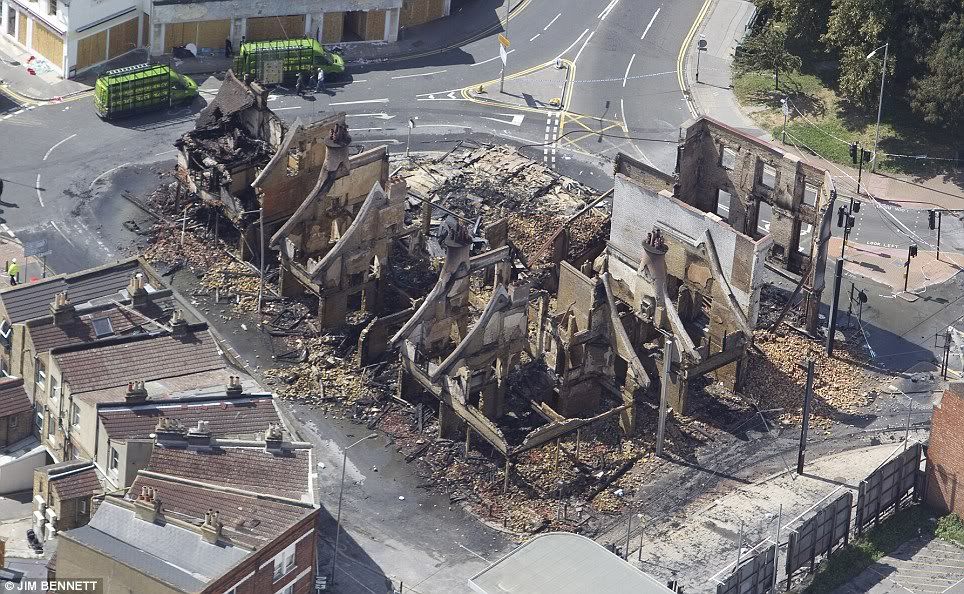
I'm a little sorry for the facetious tone of yesterday's posting. That was before hell broke out in numerous locations around London and elsewhere last night. My intention yesterday was to make some kind of serious point through jesting. Today jokes about England's crisis die before they arise.
Well, what kind of serious point is to be made about this eruption of madness? It's hard to say. Certainly Britain's failed program of forced multiculturalism is involved, and many looters are black; but the photographs show white faces among the mob too. Anarchy? The word was coined in the 19th century, but the anarchists of that day had political goals, however crackpot. Today's lawlessness seems more like an end in itself, a pure negation of civilized norms.
An American visiting Britain can be surprised by how evident the social class distinctions are, even in this age of ideological egalitarianism. The strata are clearly visible in manners and audible in people's speech. Since the industrial revolution, the U.K. has had a working class with its own identity, and often at odds with the commercial class and the vestigial aristocracy.
For a while it seemed as though the inequality was waning, with the extension of the vote in the 19th century Reform Acts and, especially, with the new power of the trade unions. The two worst periods of modern British history -- the world wars -- saw the putting aside, although not the elimination, of class antagonism.
What happened then? I think socialism changed Britain. Ever since an avowedly socialist government was elected after the last war, the country has been gradually shifting to the Left, although with periods of reaction that brought more American-style capitalism but didn't change the long-term trend toward the welfare state and centralization of power in Whitehall.
By the late 1970s a new class -- a no-class class, so to speak -- had come into being. It was beneath the working class, a nonworking class. It had absolutely no identification with (and hardly any knowledge of) British history or traditions. It was emptiness, squalor, the dole queue. "Punk," the music and the lifestyle, was part of its visible portion. The invisible part took place in dismal, graffiti-covered council flats, storage bins for the economically useless whose business was drugging, drinking, and breeding, with the cost billed to the state.
The Blitz, 2011
That was bad enough. And then, primarily after the Labour government took power in the '90s, was added mass Third World immigration. Most of what was left of the old civility crumbled as waves of colonization about which the people had never been consulted added another dimension to social division and dysfunction.
I have enjoyed my visits to England, with its fascinating remnants of a long history. I once had an English girlfriend, from Croydon in Surrey, where the mobs burned buildings last night. (I went with her to visit her family members in Croydon. That part of the London area wasn't exactly Knightsbridge, but it was middle class -- her brother worked at Lloyd's -- and I wouldn't have dreamed it would one day be the setting for Hieronymus Bosch-like scenes.)
I have no doubt there continue to be decent people throughout the country, many of whom feel pushed aside by a globalist government set on dividing and conquering the indigenes through Muslim immigration.
I have no doubt there continue to be decent people throughout the country, many of whom feel pushed aside by a globalist government set on dividing and conquering the indigenes through Muslim immigration.
But I have sensed, especially in recent visits, something decayed and pathological in the vibes. While hardly alone, the U.K. is way out front in pushing everything that is "edgy," "transgressive," and repulsive. Beyond the glare of show business and the neon strip lighting of stores, a darkness of the soul seems to fill space, underfoot, around the corner. Just out of sight. Until now.



No comments:
Post a Comment